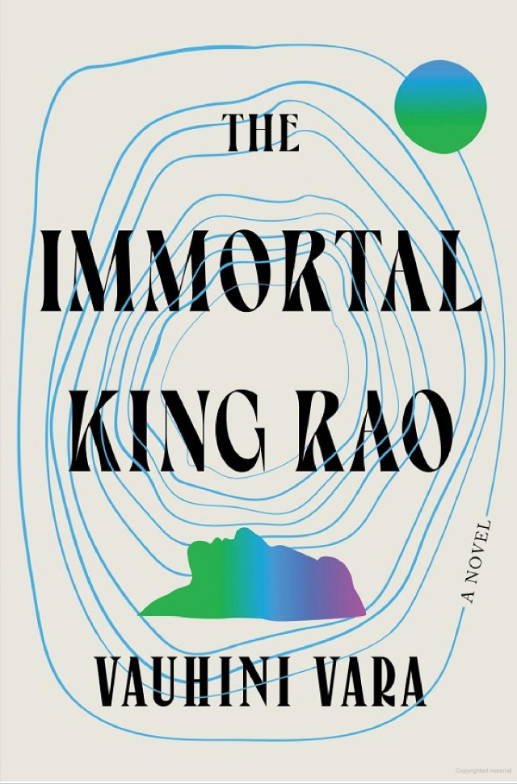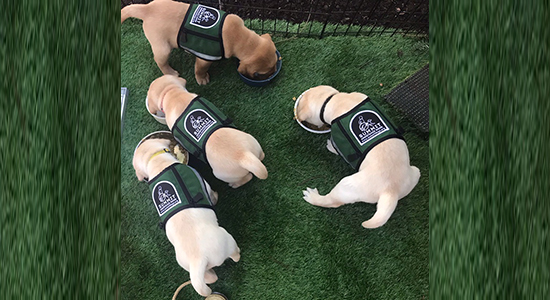||| FROM MATTHEW GILBERT for ORCAS ISLAND LIT FEST |||

Former Wall Street Journal technology reporter and New Yorker business editor Vauhini Vara’s first book, The Immortal King Rao, was among the most highly anticipated releases of the year, and for good reason. Blending her nonfiction skills and experience covering the titans of the tech world with a humble family history in India and looming climate chaos, Vara blurs the line between fantasy and reality in a dystopian “what if” that feels all too real.
Vara will be among the guest artists at this weekend’s Orcas Island Lit Fest. She shared some of her thoughts about the book and her process writing it in the following interview:
Question: There are so many threads to this story – history, hubris, ambition, relationships, and the ultimate dangers of technology. What was your initial impulse in writing it, and how did the various pieces come together?
Answer: My first job out of college, in 2004, was as a technology reporter at the Wall Street Journal, where the main companies I wrote about were Oracle, run by Larry Ellison, and Facebook, run by Mark Zuckerberg. I became fascinated with these men — partly because they had built really successful, innovative companies but also because while they seemed all-powerful, they also faced serious pressures, especially from those who had invested in their companies.
Later, in 2009, I was on a leave of absence from the journal to attend graduate school when my dad, who grew up in a Dalit family on a coconut grove in South India, suggested that I write a novel based partly on his family. I thought it was a good idea, and as I began to write, I ended up with a character — King Rao — who is born on a coconut grove like my dad’s but ends up moving to the U.S. in the 1970s and starting a tech company.
Historically, my dad’s family used to be tenant farmers — they didn’t own the land on which they worked — but in the 20th century, as it began to be possible for Dalit families to own land, they ended up taking ownership of the land on which they’d worked for generations.
Question: What was your biggest challenge in the writing of King Rao?
Answer: The entire process was challenging, but I think the hardest part was imagining the dystopian future in which much of the novel takes place. I come from a literary fiction background — not a science fiction one — and I really had to learn new skills, like world-building, in order to make this story work.
I wanted to build a world that could plausibly arise over the next several decades if we keep moving in the direction we’re currently moving in — a world in which AI (artificial intelligence) algorithms play an even bigger role in corporate and government decision-making; a world in which the wealth gap between the richest and poorest is even wider; a world in which climate change has moved even further toward having devastating and irreversible consequences. Then I had to imagine that world. For that part, I relied partly on research: I read official reports that tried to predict the course of climate change, for example, and corporate white papers laying out how technology might be used to allow people to connect to the Internet with their minds (see Elon Musk’s Neuralink). All of that — plus my own imagining — played a role. As for how people engage with technology, it was important for me to show, in the novel, how technology is a human-made product — influenced by our own biases and greed — just like any other.
Question: Can you share something more of your intentions in writing the book beyond your initial impulse, and/or how the characters or the storyline shifted during the process?
Answer: The challenge I set for myself was to tell a story about global capitalism that took place in familial, domestic spheres. At first, the main character Athena was telling only the story of her father and his ascent; it was only over time that I became interested in her own narrative, and I made that more dominant.
Question: Do you feel that you’ve switched over from journalism to fiction writing?
Answer: Not at all. I began writing fiction in college and have consistently written and published fiction since — short stories, in literary journals. I’ve also consistently worked as a journalist and an editor, which I’ll continue to do. I love both fiction and journalism too much to abandon either one. In fact, I recently published a piece in Wired [“Fast, Cheap, and Out of Control: Inside Shein’s Sudden Rise”] — an investigation into a fashion company called Shein, which is the third most valuable private company in the world after SpaceX and TikTok’s parent company — a day after my novel came out.
Question: You spent a significant chunk of your upbringing in the Seattle area, and much of the story takes place in those environs. Is there something about this area that is especially appealing to you? Do you consider yourself a “PNW writer?”
Answer: I think of the Pacific Northwest as home — so, yes, I absolutely do proudly consider myself a Pacific Northwest writer!
**If you are reading theOrcasonian for free, thank your fellow islanders. If you would like to support theOrcasonian CLICK HERE to set your modestly-priced, voluntary subscription. Otherwise, no worries; we’re happy to share with you.**








